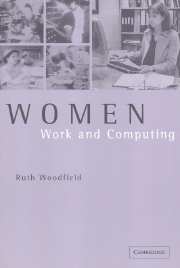Book contents
- Frontmatter
- Contents
- Preface
- List of abbreviations
- 1 The myth of the neutral computer
- 2 Computers, communication and change
- 3 Softech: a ‘twenty-first-century organisation’
- 4 Male and female pathways through the unit
- 5 Hybrids and hierarchies
- 6 Understanding the relationship between gender and skill
- 7 The female future and new subjectivities
- Conclusion: is the future female?
- List of references
- Index
3 - Softech: a ‘twenty-first-century organisation’
Published online by Cambridge University Press: 22 September 2009
- Frontmatter
- Contents
- Preface
- List of abbreviations
- 1 The myth of the neutral computer
- 2 Computers, communication and change
- 3 Softech: a ‘twenty-first-century organisation’
- 4 Male and female pathways through the unit
- 5 Hybrids and hierarchies
- 6 Understanding the relationship between gender and skill
- 7 The female future and new subjectivities
- Conclusion: is the future female?
- List of references
- Index
Summary
Introduction: qualitative case-studies and the use of ethnographic techniques
It has been suggested above that at least three times over the past thirty years the predictive commentary on the relationship between women and computing has taken an optimistic turn. It has also been claimed that in the case of the first instance, the passage of time between the 1970s and 1980s saw the emergence of a sufficiently large amount of empirical data which so squarely contradicted the assumptions behind this optimism that it became unsustainable. When the research that forms the basis of this book began in the early 1990s, there was only a comparatively small amount of directly relevant empirical work that could attest to the degree of legitimacy of either of the two more recent statements of optimism. It is important to note that whilst many of the commentators who formed these waves predicted changes which were to appear at an unspecified future point, there was a clear sense in which, at the very least, signs of change were anticipated during the last decade of the twentieth century. As a consequence it was my view that the legitimacy of some of the key claims made could in fact begin to be explored by empirical research; especially if such research was conducted in a context and manner which maximised the chances of detecting indications, however subtle, of the likely course of the future women–computer relationship.
- Type
- Chapter
- Information
- Women, Work and Computing , pp. 50 - 88Publisher: Cambridge University PressPrint publication year: 2000



